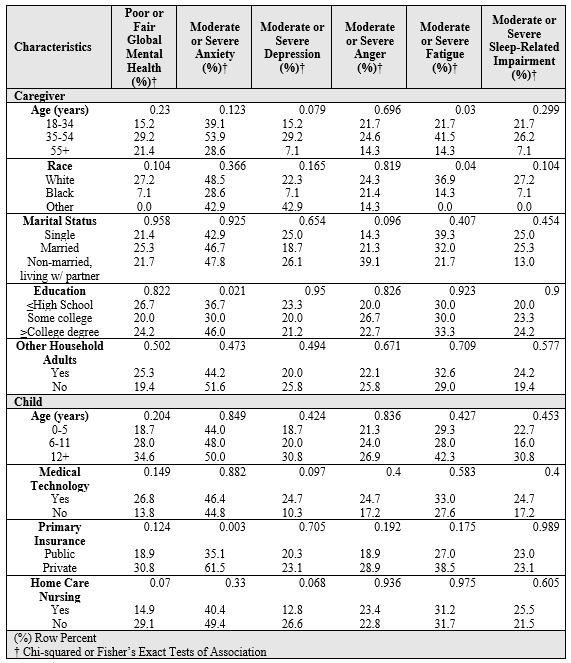Children with Chronic Conditions
Category: Abstract Submission
Children with Chronic Conditions III
595 - Family Caregivers of Children with Medical Complexity Report High Levels of Emotional Distress
Monday, April 25, 2022
3:30 PM - 6:00 PM US MT
Poster Number: 595
Publication Number: 595.403
Publication Number: 595.403
Lydia M. McLachlan, UPMC Children's Hospital of Pittsburgh, Pittsburgh, PA, United States; Justin A. Yu, UPMC Children's Hospital of Pittsburgh, Pittsburgh, PA, United States

Lydia M. McLachlan
Research Assistant
UPMC Children's Hospital of Pittsburgh
Pittsburgh, Pennsylvania, United States
Presenting Author(s)
Background: Poor caregiver mental health hinders caregivers’ ability to provide care and navigate healthcare systems for their child. The prevalence and factors associated with poor mental health among caregivers of children with medical complexity are presently unclear.
Objective: To 1) describe the prevalence of elevated levels of emotional distress among family caregivers of children with medical complexity (CMC), and 2) examine relationships between CMC caregiver emotional distress and caregiver and child characteristics.
Design/Methods: Family caregivers of CMC receiving care at a pediatric complex care center within a tertiary-care children’s hospital were surveyed from May 2021 to December 2021. Patient-Reported Outcomes Measurement Information System (PROMIS) instruments assessed global mental health and symptoms of emotional distress (anxiety, depression, anger, fatigue, and sleep-related impairment). Using established cut points, we dichotomized caregiver PROMIS scores as non-elevated (normal or mild) or elevated (moderate or severe) for each measure. We used summary statistics and t-tests to describe CMC caregiver mean PROMIS scores and compared them with the general US population. Chi-squared and Fisher’s exact tests of analysis examined relationships between elevated levels of emotional distress among CMC caregivers and child and caregiver characteristics.
Results: Among 126 family caregivers of CMC, mean PROMIS scores for global mental health, anxiety, depression, anger, fatigue, and sleep-related impairment were significantly poorer than the general US population norm of 50 (Figure 1; all p< .001). The prevalence of elevated emotional distress ranged from 21.4% (depression) to 46.0% (anxiety). In tests of association, elevated levels of caregiver anxiety were significantly associated with higher caregiver educational attainment and child private health insurance (Table 1; both p< .05). Elevated caregiver fatigue was significantly associated with caregiver ages 35-54 years and White race (both p< .05). The relationships between poor/fair global mental health and receiving home care nursing support approached statistical significance (p < 0.1), as did the associations between elevated levels of depression and caregiver age, child’s use of medical technology, and receipt of home care nursing (all p< 0.1).Conclusion(s): Sizeable proportions of caregivers of CMC reported elevated levels of emotional distress. Caregiver age, lack of home care nursing support, and child private health insurance seem to be associated with poorer caregiver mental health. However, further research is needed.
Curriculum Vitae.pdf
Associations Between Caregiver and Child Characteristics and Moderate or Severe Distress
Objective: To 1) describe the prevalence of elevated levels of emotional distress among family caregivers of children with medical complexity (CMC), and 2) examine relationships between CMC caregiver emotional distress and caregiver and child characteristics.
Design/Methods: Family caregivers of CMC receiving care at a pediatric complex care center within a tertiary-care children’s hospital were surveyed from May 2021 to December 2021. Patient-Reported Outcomes Measurement Information System (PROMIS) instruments assessed global mental health and symptoms of emotional distress (anxiety, depression, anger, fatigue, and sleep-related impairment). Using established cut points, we dichotomized caregiver PROMIS scores as non-elevated (normal or mild) or elevated (moderate or severe) for each measure. We used summary statistics and t-tests to describe CMC caregiver mean PROMIS scores and compared them with the general US population. Chi-squared and Fisher’s exact tests of analysis examined relationships between elevated levels of emotional distress among CMC caregivers and child and caregiver characteristics.
Results: Among 126 family caregivers of CMC, mean PROMIS scores for global mental health, anxiety, depression, anger, fatigue, and sleep-related impairment were significantly poorer than the general US population norm of 50 (Figure 1; all p< .001). The prevalence of elevated emotional distress ranged from 21.4% (depression) to 46.0% (anxiety). In tests of association, elevated levels of caregiver anxiety were significantly associated with higher caregiver educational attainment and child private health insurance (Table 1; both p< .05). Elevated caregiver fatigue was significantly associated with caregiver ages 35-54 years and White race (both p< .05). The relationships between poor/fair global mental health and receiving home care nursing support approached statistical significance (p < 0.1), as did the associations between elevated levels of depression and caregiver age, child’s use of medical technology, and receipt of home care nursing (all p< 0.1).Conclusion(s): Sizeable proportions of caregivers of CMC reported elevated levels of emotional distress. Caregiver age, lack of home care nursing support, and child private health insurance seem to be associated with poorer caregiver mental health. However, further research is needed.
Curriculum Vitae.pdf
Associations Between Caregiver and Child Characteristics and Moderate or Severe Distress

